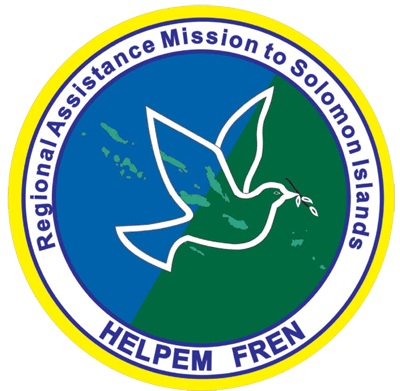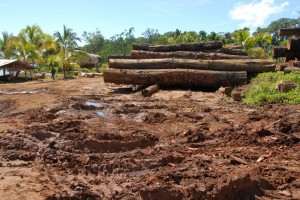As we’re approaching the Regional Assistance Mission to Solomon Islands’ (RAMSI) ten year anniversary, as well as the anticipated transition towards a scaled down civilian mission, there appears to be a unanimous view in the region that the intervention has been a great success.
Ten years on, Solomon Islands’ economic growth rates have been robust; peace and stability have been maintained, with the exception of the April 2006 Honiara riots; and Solomon Islands’ political leaders could not be grateful enough in public for Australia’s contribution to making this turn-around possible.
The inconvenient truth, however, is that RAMSI’s success to date has had little to do with its self-described mission of building state capacity and a lot to do with its unwitting facilitation of rapid expansion in the unsustainable logging, and to a lesser extent, fishing industries.
Here also lies the seeds of the potential undoing of RAMSI’s apparent achievements. The expected exhaustion of commercial logging stocks in the Solomons over the next few years will likely destabilise the country again, although it is hard to predict precisely in what ways and to what extent.
To understand why, we must first note that contrary to the expectations of modernisation theory, which is still at the core of mainstream development policy ideas such as ‘good governance’, not all ‘good’ things come together. It is not essential for liberal market-led development, democracy and peace, to all arrive in one package. It is quite common, for example, to find that peace and stability are bought at the expense of empowering some unsavoury groups in the state and in society.
With this in mind, it is crucial to point out that in Solomon Islands the environmentally destructive and communally divisive practice of commercial logging on customary land has played a pivotal role from independence in bringing together otherwise flimsy political coalitions. Hence, RAMSI’s effect on the logging industry is not a side-show to the main business of state ‘capacity building’, but the most significant aspect of the intervention. Yet, preciously little attention has been paid to this by most commentators.
Unsurprisingly, for a country that never went through the industrial revolution and where a national market and collective national or class identities have never formed, ideological differences do not play a meaningful role in politics. Instead, politics is intensely local and election to office requires maintaining local support-bases, usually through the dispensation of patronage and material rewards.
In the near absence of alternatives for generating cash incomes, logging has become a widespread practice, and logger-backed politicians have been particularly powerful in Solomon Islands in most post-independence governments. Arguably, the violent conflict of the late 1990s had its origins in the Asian financial crisis. The crisis caused a sharp decline in log export revenue and thus undermined the logging-dependent structures of power running through the Solomons’ state and society, which although highly exploitative had kept the peace to that point.
By contrast, the RAMSI-era has seen a logging boom so big that logged timber volumes have reached extraordinary levels of six to eight times the estimated sustainable yield of 250,000 cubic metres per annum – more than double the previous logging boom of the 1990s.
Of course, nowhere in RAMSI’s stated objectives was ‘initiate an unsustainable logging boom’ mentioned. But by pacifying the country and cutting ‘red tape’ for foreign investment it has unwittingly (though entirely to be expected), unleashed a logging investment bonanza. No doubt, a greater portion of the rents generated from logging now ends up in state coffers than before. But this does not alter the inescapable fact that this logging boom will not last much longer, and its legacy in terms of long-term economic development will be minimal.
It is precisely because of this logging boom that most powerful interests in Solomon Islands have had no reason to resist RAMSI. It has bought the peace by reinforcing their already privileged position. But one wonders what the end of the logging boom would mean for the sustainability of this arrangement? Fledgling mining operations are a long way off replacing logging revenue. And because mining is highly localised, it is possible we could see the intensification of competition over control of mining rents (in a way not previously seen in logging) as timber is a widespread resource.
As RAMSI’s most significant ‘achievement’ to date has been supporting an unsustainable logging boom, I can only regrettably conclude that the current period of growth and stability is likely to prove achingly ephemeral.
This post continues our series looking at the Regional Assistance Mission to Solomon Islands (RAMSI) as it marks its tenth anniversary (23 July 2003), and enters a new period of transition (1 July 2013). The series is collected here.
Dr Shahar Hameiri is a senior lecturer in international politics at the Asia Research Centre, School of Management and Governance, Murdoch University.




I agree with Shahar about the way RAMSI has conducted operations in that it left the way open for more foreign investments in the way of logging equipment to be brought in.
There will be an awful collapse in revenue once the logs are cut out. Years ago Australian forest officers were sent to advise the authorities on a more sustainable forest policy but the advice was not acceptable to those MPs who were raking in the timber money from their personal involvement so the officers were sent packing.
Will there be an uncontrolled onslaught on the fish stocks? Already there are agreements for a Korean company to set up a plant at Doma. Just hope the Pacific Fisheries Bureau can keep a lid on the catch total.
I don’t want to appear an apologist for RAMSI but please provide evidence of their promotion of excessive logging. I agree that the SI economy will have trouble once logging stops and I agree that export of sawn timber would likely have been a better option but I fail to see where RAMSI fits in here. When you say “the advice was not acceptable to those MPs who were raking in the timber money from their personal involvement so the officers were sent packing.”, are you suggesting RAMSI should have somehow stopped this from happening. I suggest that had RAMSI publically attempted to do that they would have set themselves up as an easy target for ” those MPs who were raking in the timber money” who would then severely criticise them for neo-colonial interference in SI domestic affairs, i.e. a no win situation.
It is a truism that correlation does not necessarily imply connection. RAMSI’s 10 years may well be correlated with an expansion of logging but none with experience of the forestry sector in the Solomons would blame RAMSI for the iniquitous waste of forest resources. Quite the contrary, in fact, as Australia has a long history of offering support for the forestry sector to help blunt the sharp pains that logging induces. Some of that support was implemented but its outcomes ignored in practice. Some was not even allowed to start – blocked by politicians loathe to see restrictions placed on their Asian logger supporters.
It is true, as Hameiri writes, that: “… in Solomon Islands the environmentally destructive and communally divisive practice of commercial logging on customary land has played a pivotal role from independence in bringing together otherwise flimsy political coalitions.” However it is bizarre to claim that RAMSI has “… unleashed a logging investment bonanza …”
Perhaps even more surprising than the spurious claim of RAMSI responsibility for logging expansion is the author’s contention that “the violent conflict of the late 1990s had its origins in the Asian financial crisis.” No need to explain away that one. The origins of the conflict (solely internal) are well known.
Dear Graham,
Thanks for taking the time to reply. I think that had you read my piece carefully you would’ve noted that I certainly do NOT argue that the expansion in logging was intentional on RAMSI’s part. I simply argue that RAMSI has permitted logging to expand by providing conditions conducive to this. I also argue that this expansion in logging facilitated support for RAMSI by local elites.
I elaborate this issue here:
Hameiri, Shahar, ‘Mitigating the Risk to Primitive Accumulation: State-Building and the Logging Boom in Solomon Islands’, Journal of Contemporary Asia 42, no. 3 (2012), pp. 406-25.
Regarding the 1990s crisis, have a look at this:
Hameiri, Shahar. 2007. “The trouble with RAMSI: reexamining the roots of conflict in Solomon Islands.” The Contemporary Pacific 19(2):409-41.
Best,
Shahar
Dear Shahar
I read your article in exactly the same way as Graham, but now you seem to be changing your argument by seeming to say that the political stability that RAMSI has engendered has allowed the heinous logging to take place.
What do you want?
RAMSI has many faults but promoting logging is not one of them. We must place the reasons for the excessive logging where they lie and not use RAMSI as the whipping boy for corrupt Solomon Islanders. The RAMSI target is too easy.
Bob Macfarlane
Dear Bob, I’ll reiterate the same point I made before. My post was aiming to explain why RAMSI has been so successful at fostering stability in Solomon Islands (because it has not at all challenged the elites benefiting from logging – in fact it has unwittingly provided conditions suitable for rapid expansion in logging), and therefore why this stability could prove very temporary indeed. This is a point often missed by those who focus on ‘capacity building’ etc, as if state capacity exists in the abstract, outside of concrete social and political relations.
Regards,
Shahar
The big mistake in the logging of the Solomons has been not to insist that logs should be processed in the islands. This could have been achieved by a heavy export tax on logs but not on sawn timber. This would have achieved more local employment and slowed down the cutting of the forests.
Dr Hameiri,
I would like to see similar article that would accurately depict what is happening in Papua New Guinea: add major mines and fisheries and a longer time frame. As a 75 year old I will only get to see the lead up to the final state. It will take a great leader to reverse the trend downwards.
Tony Flynn